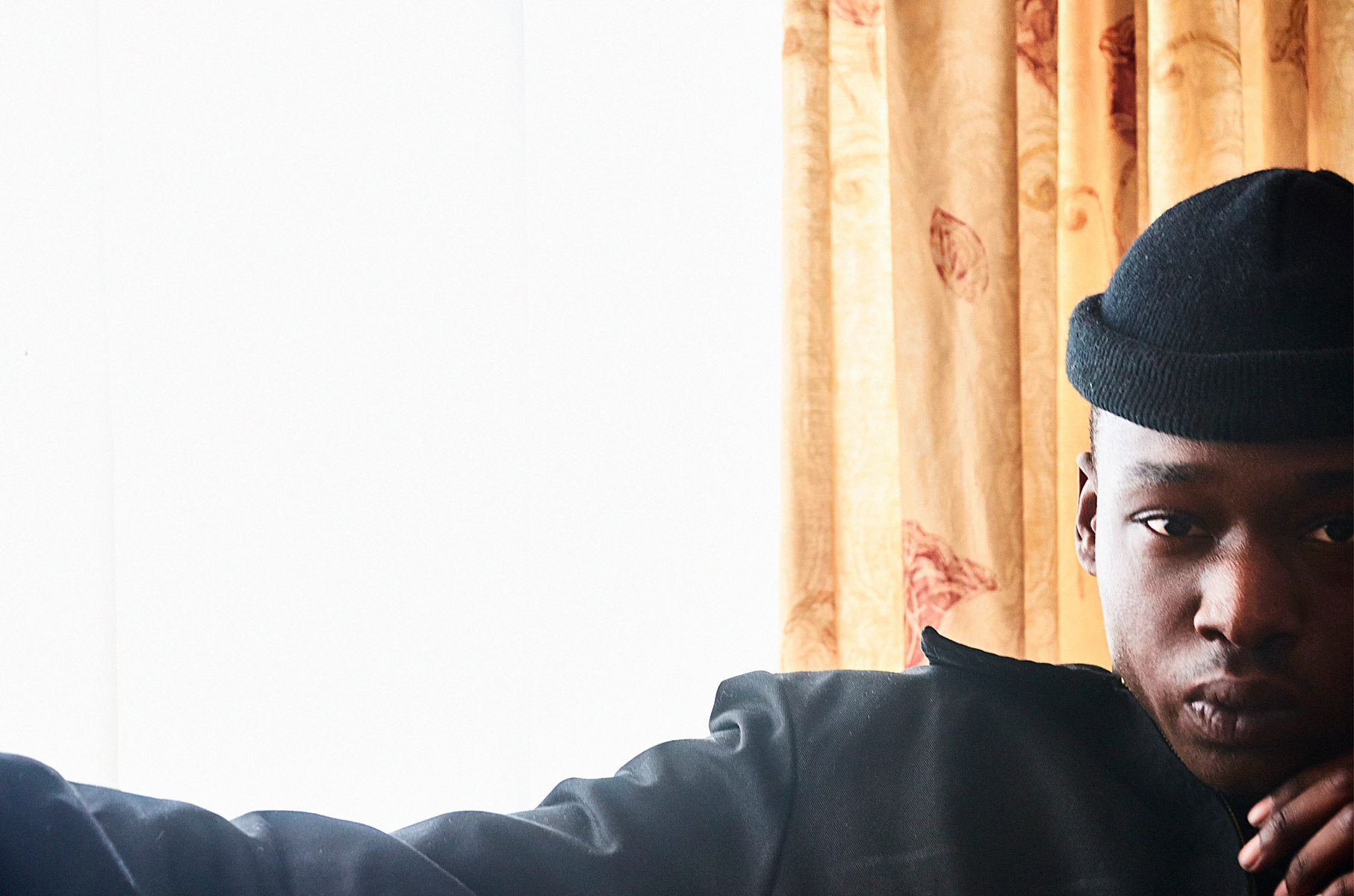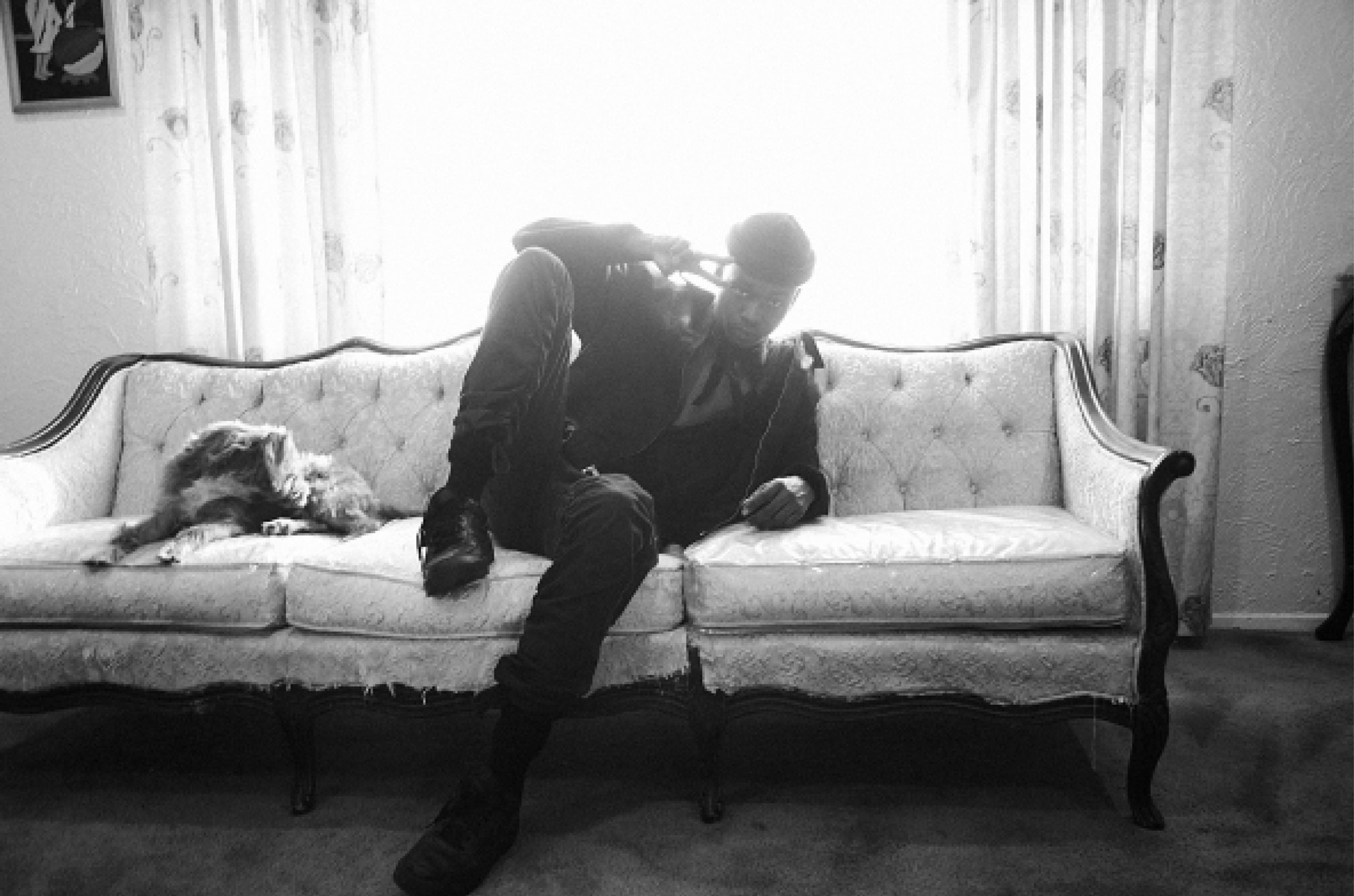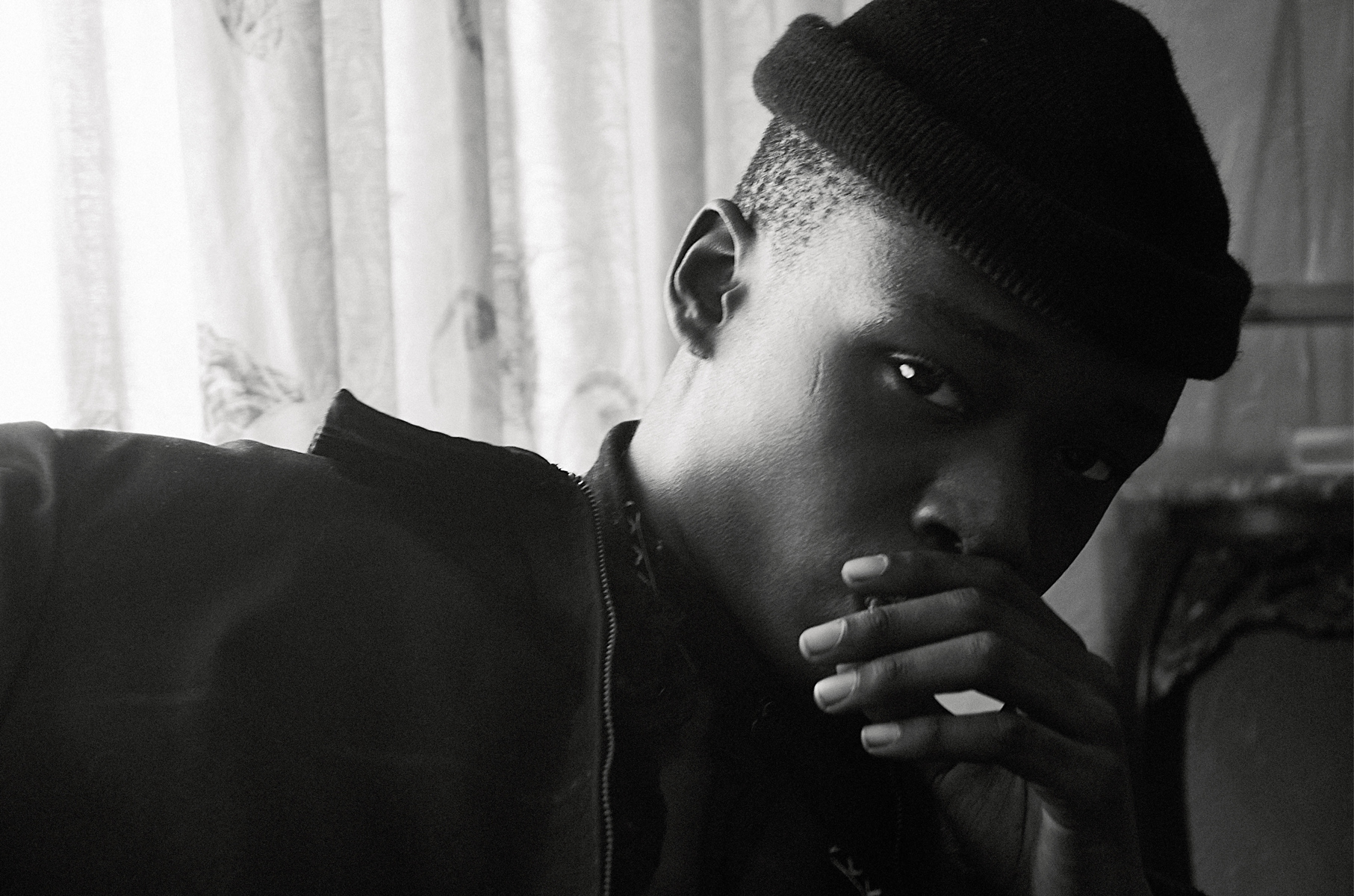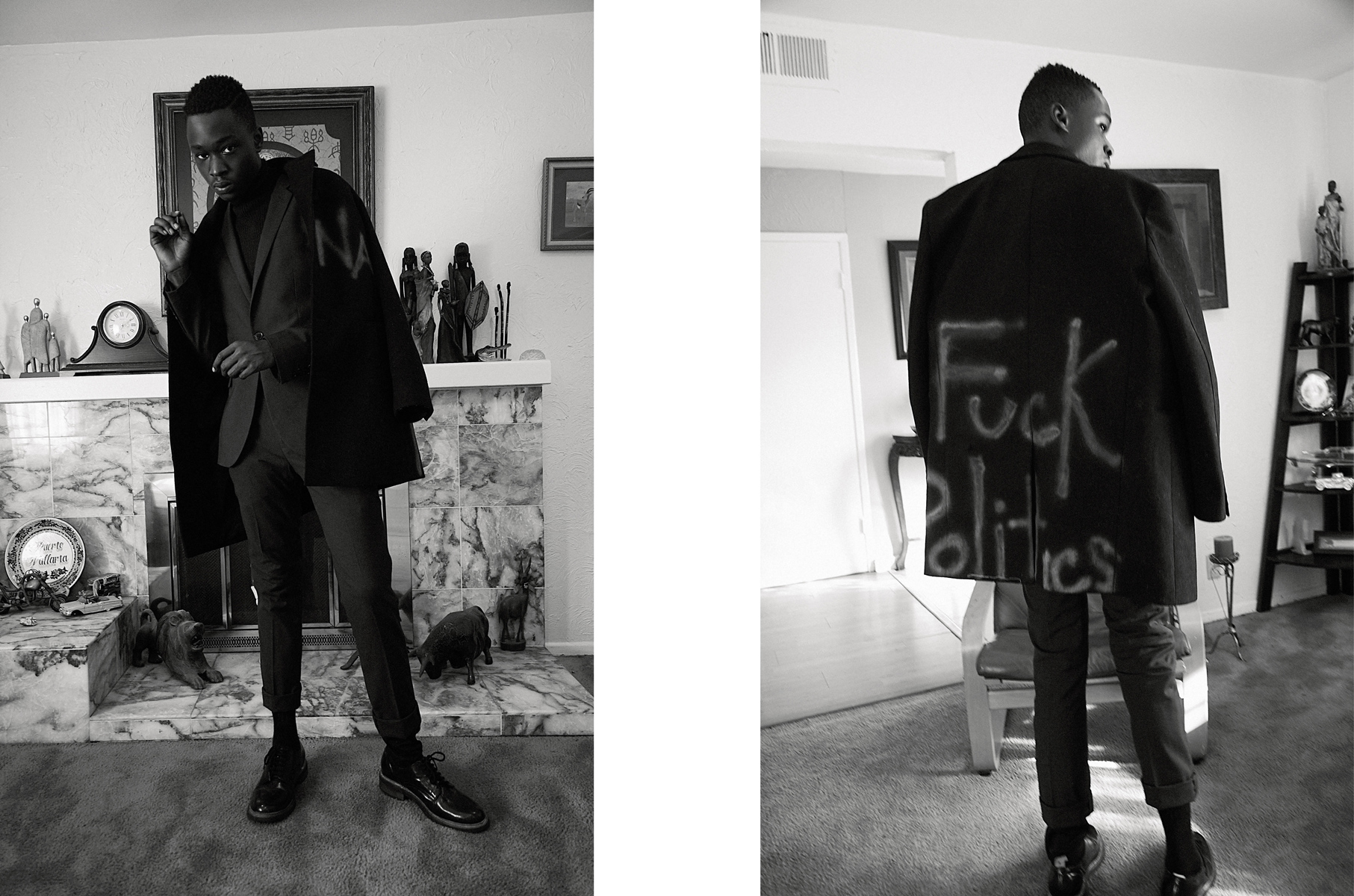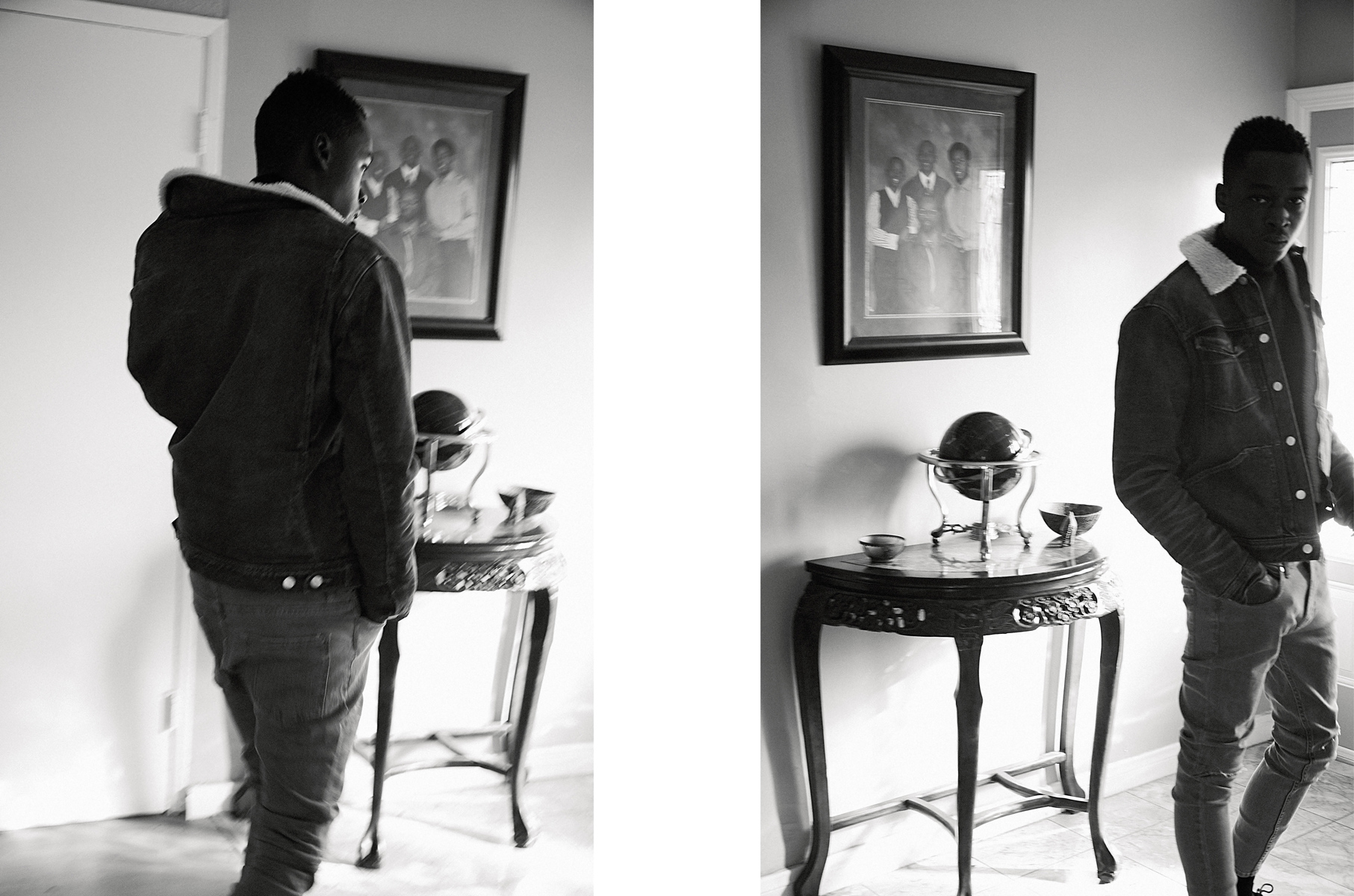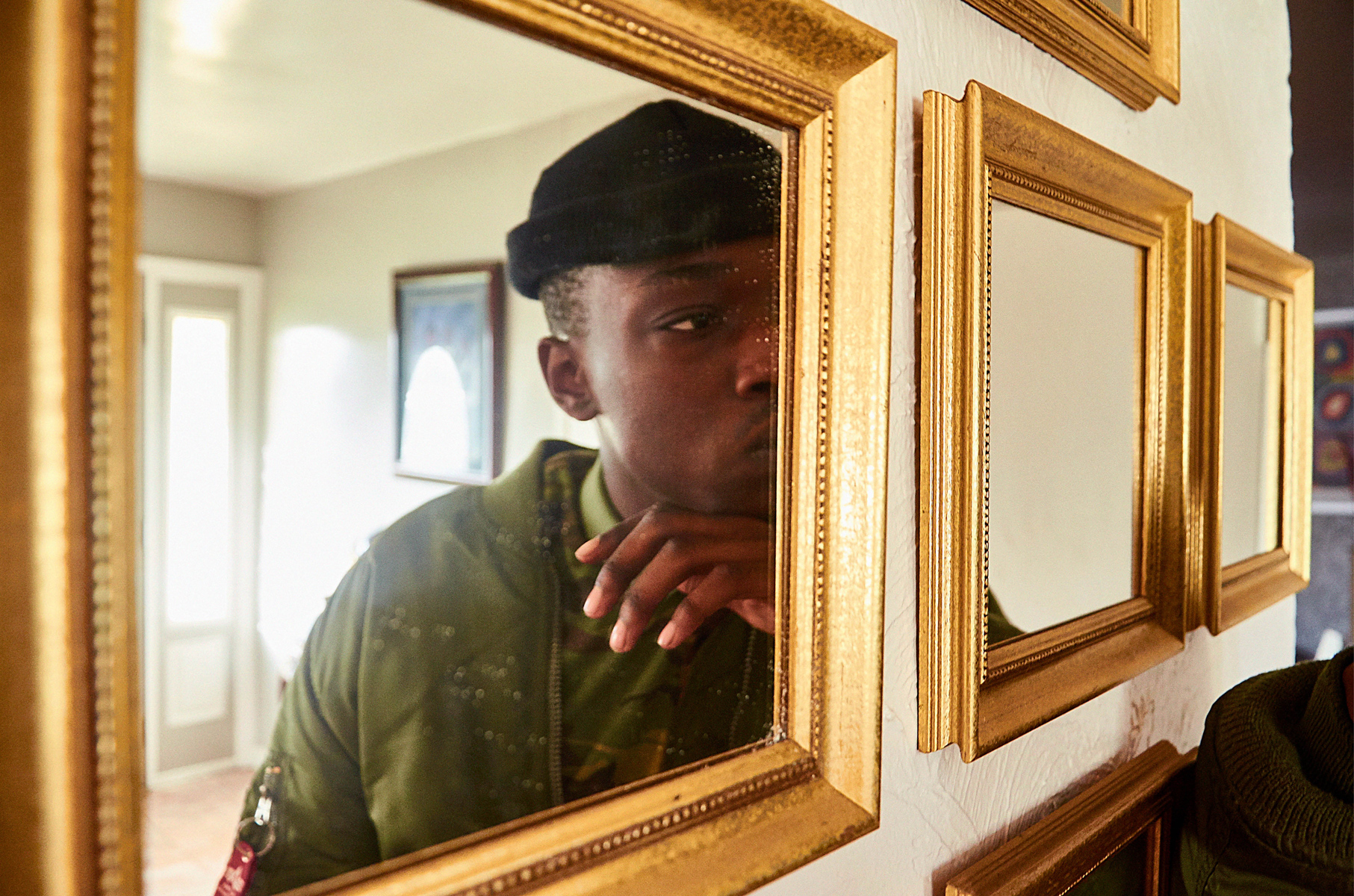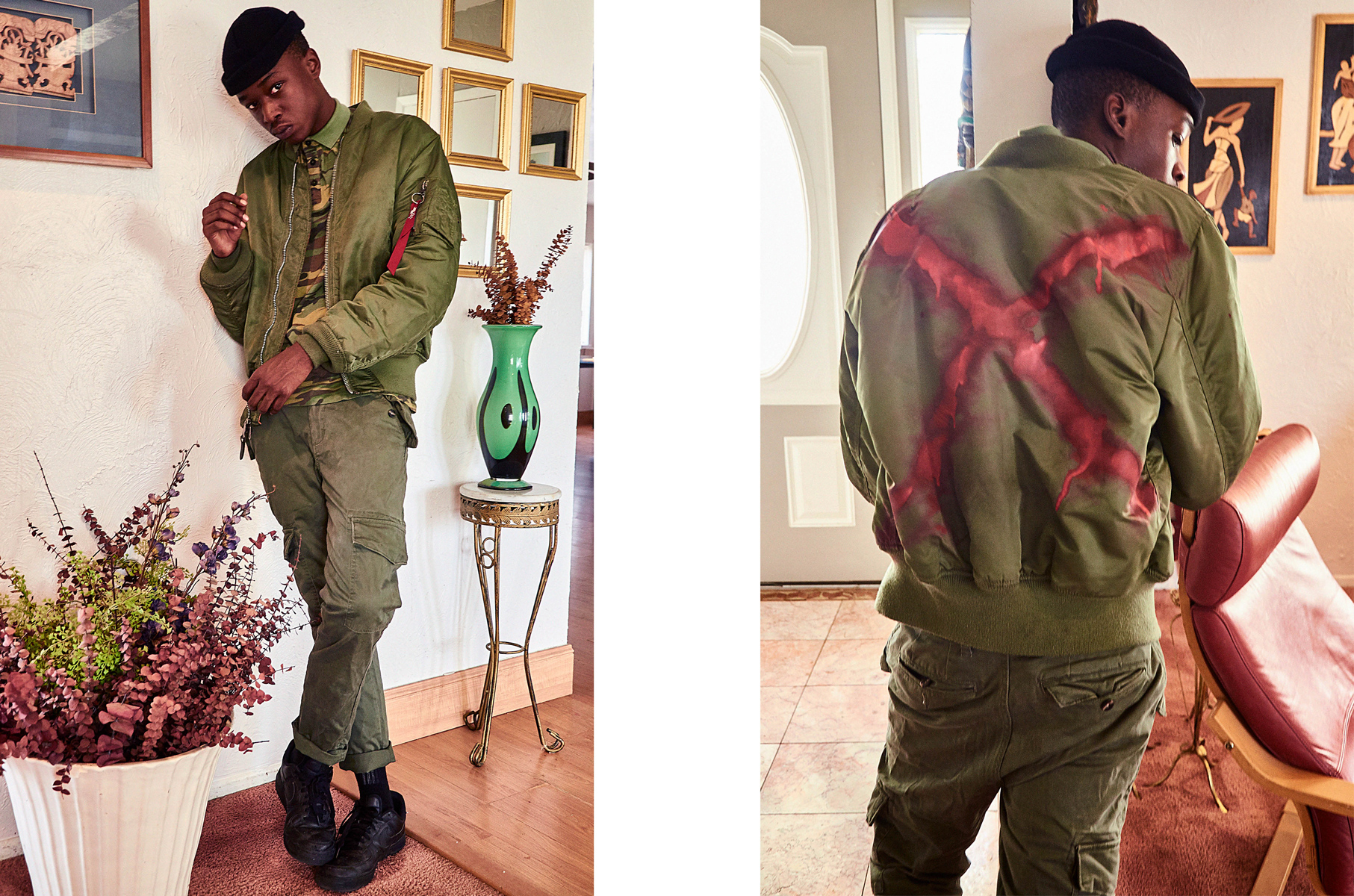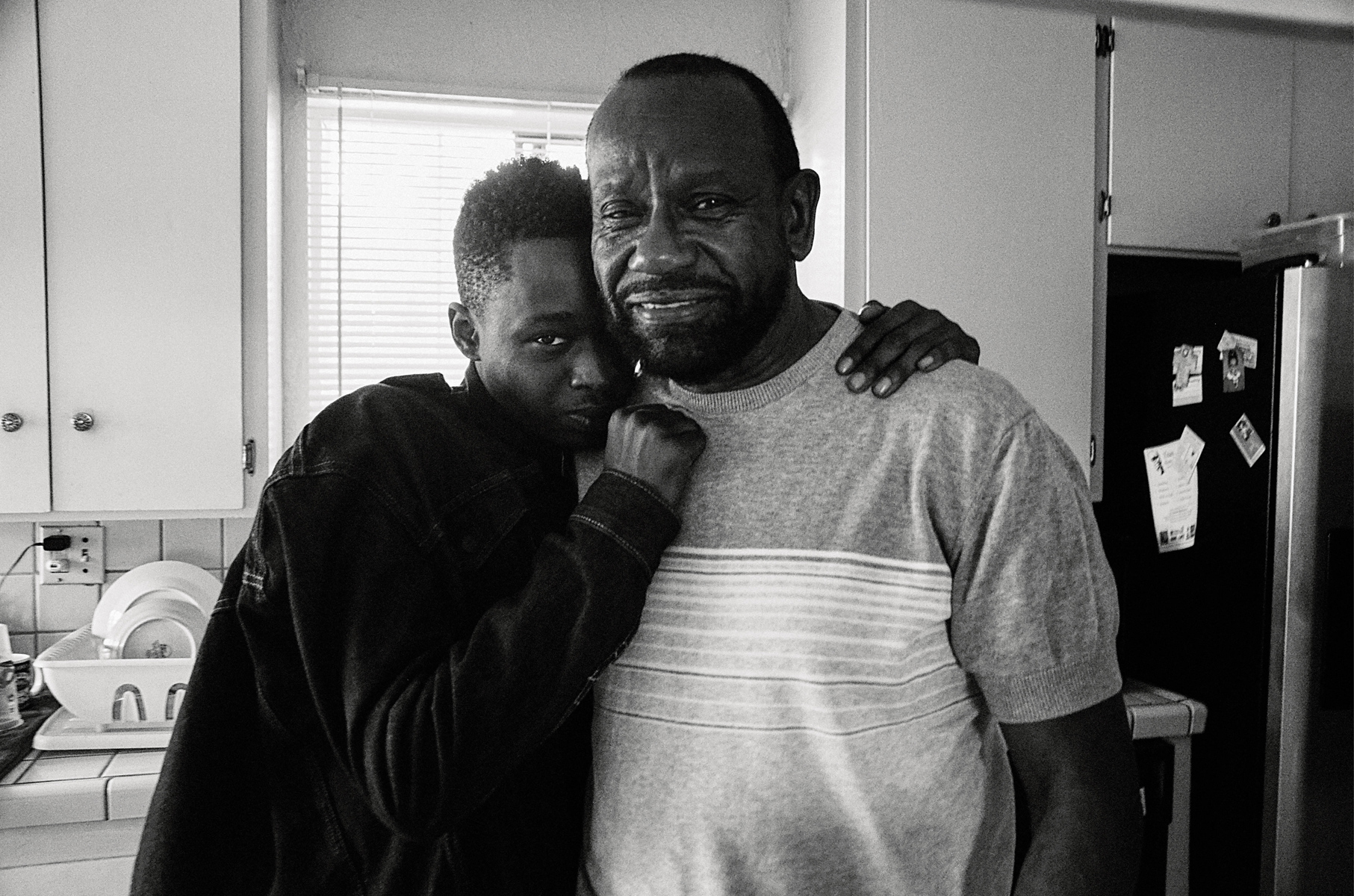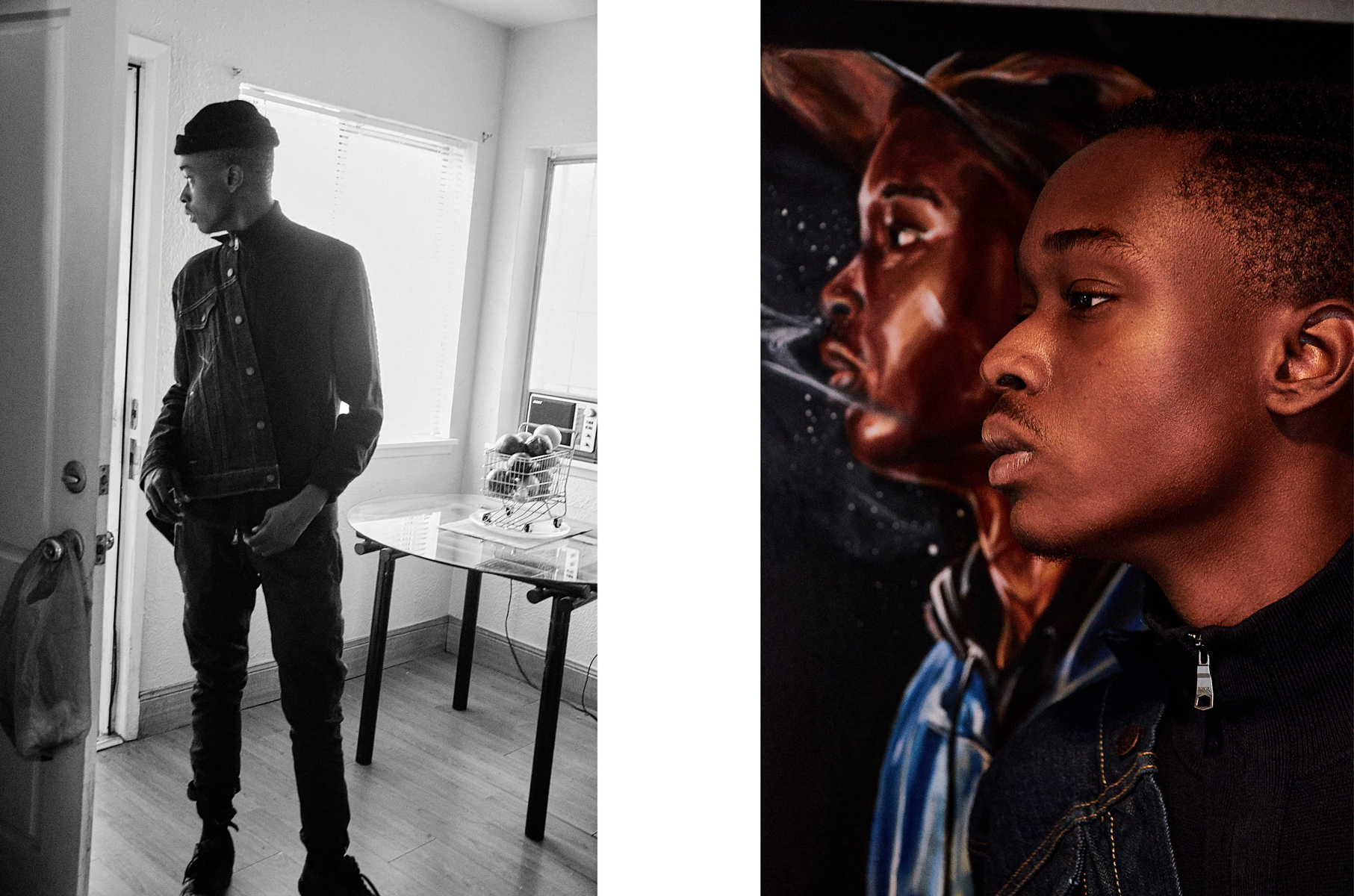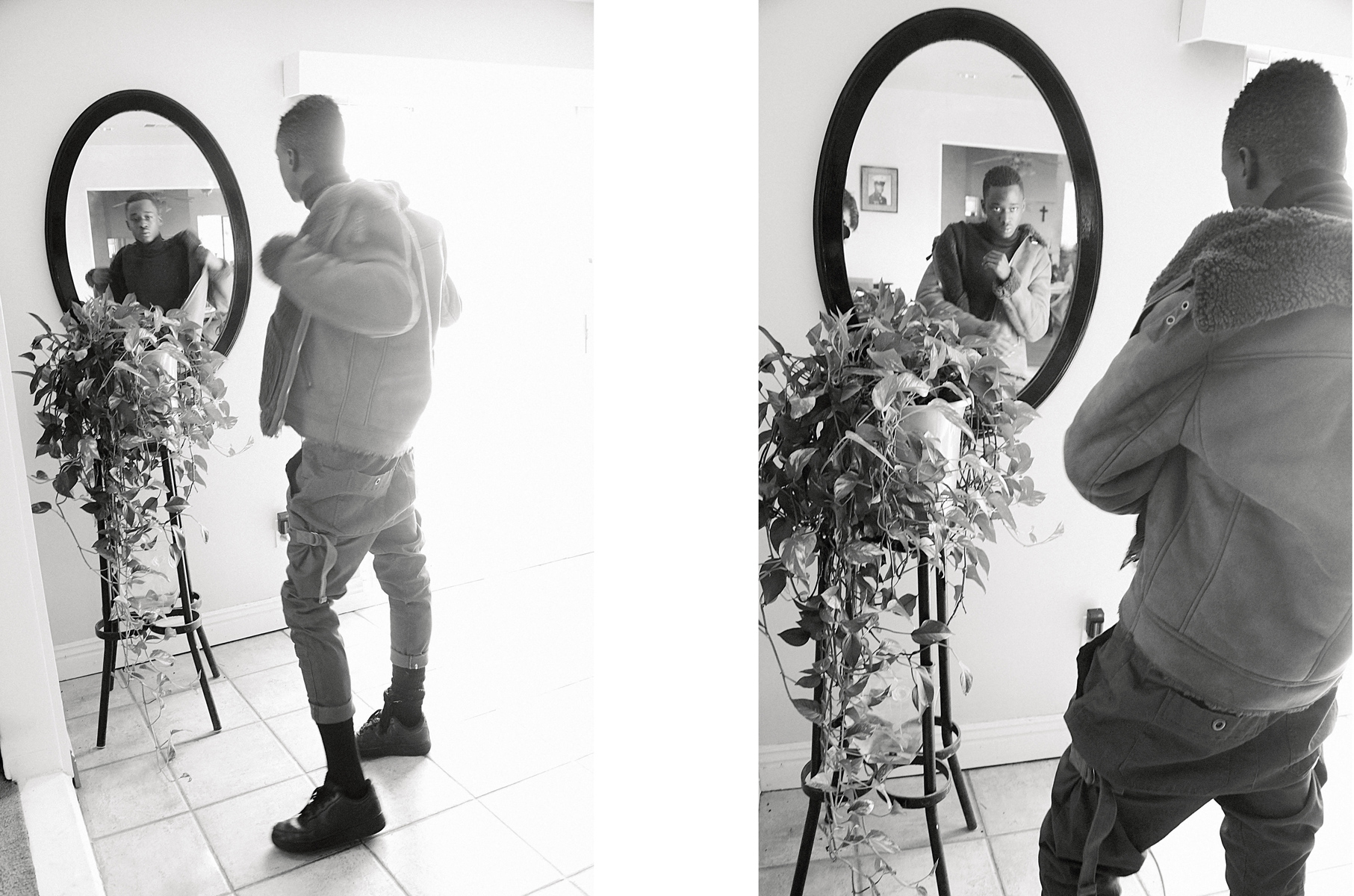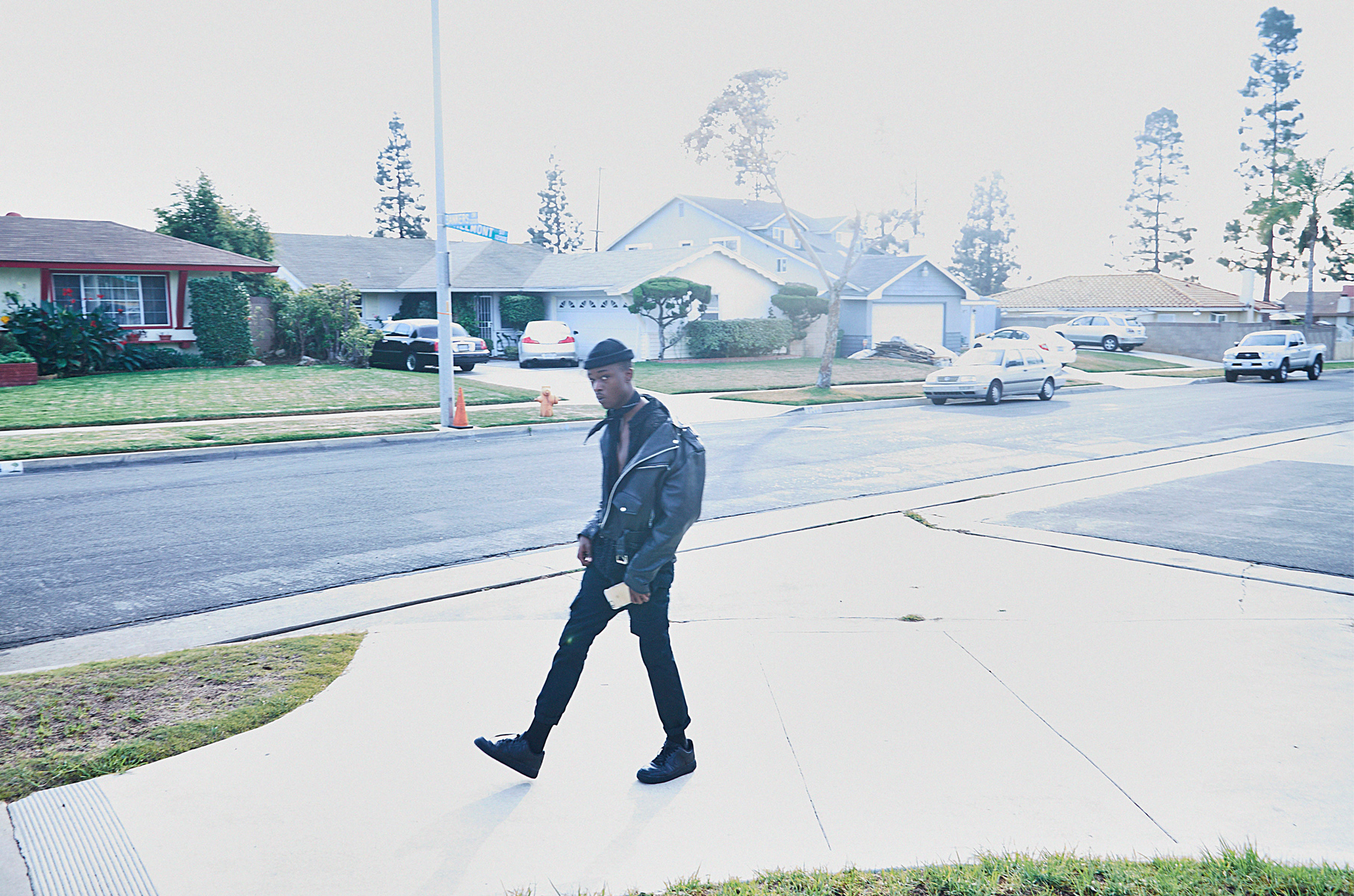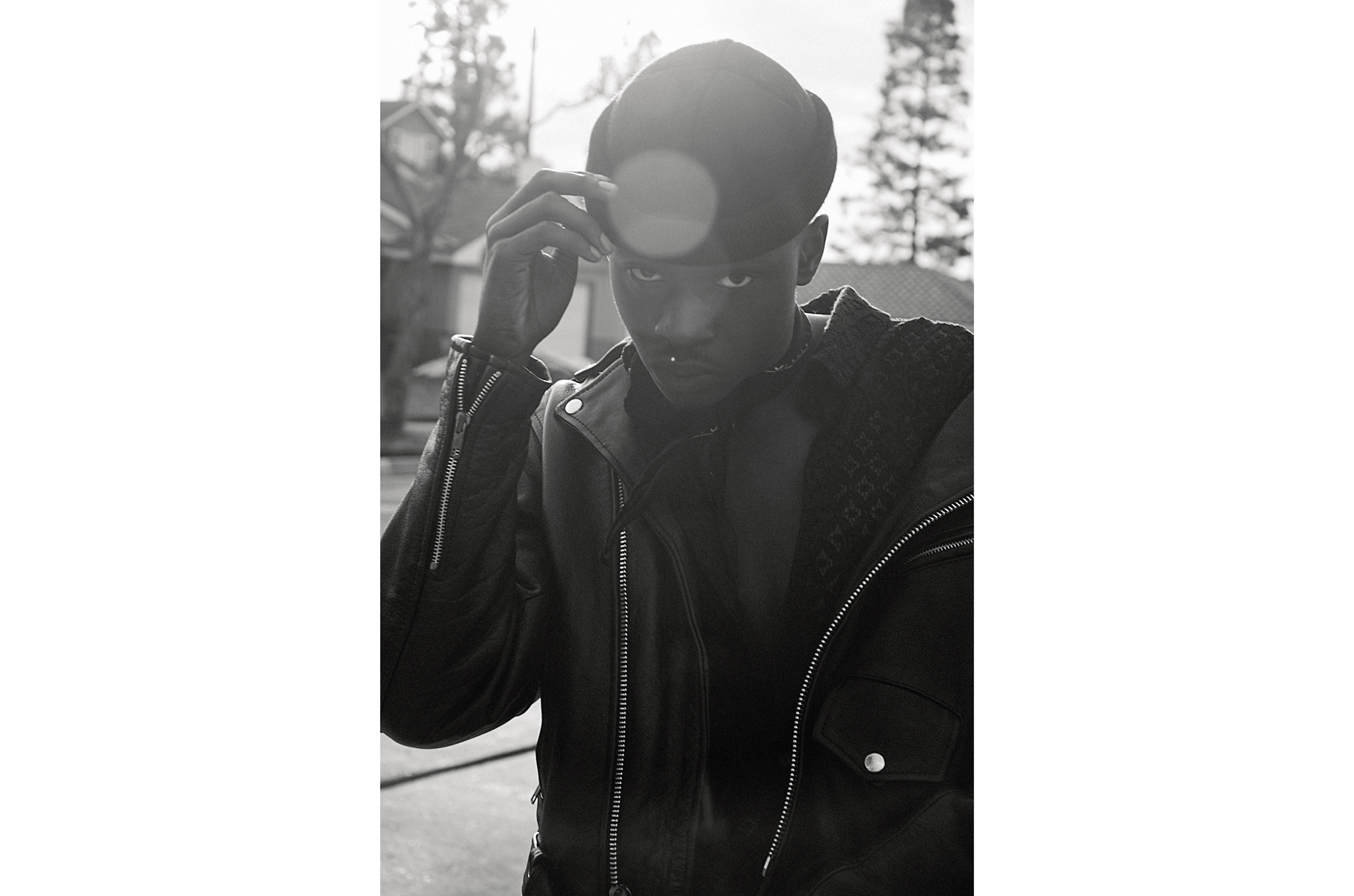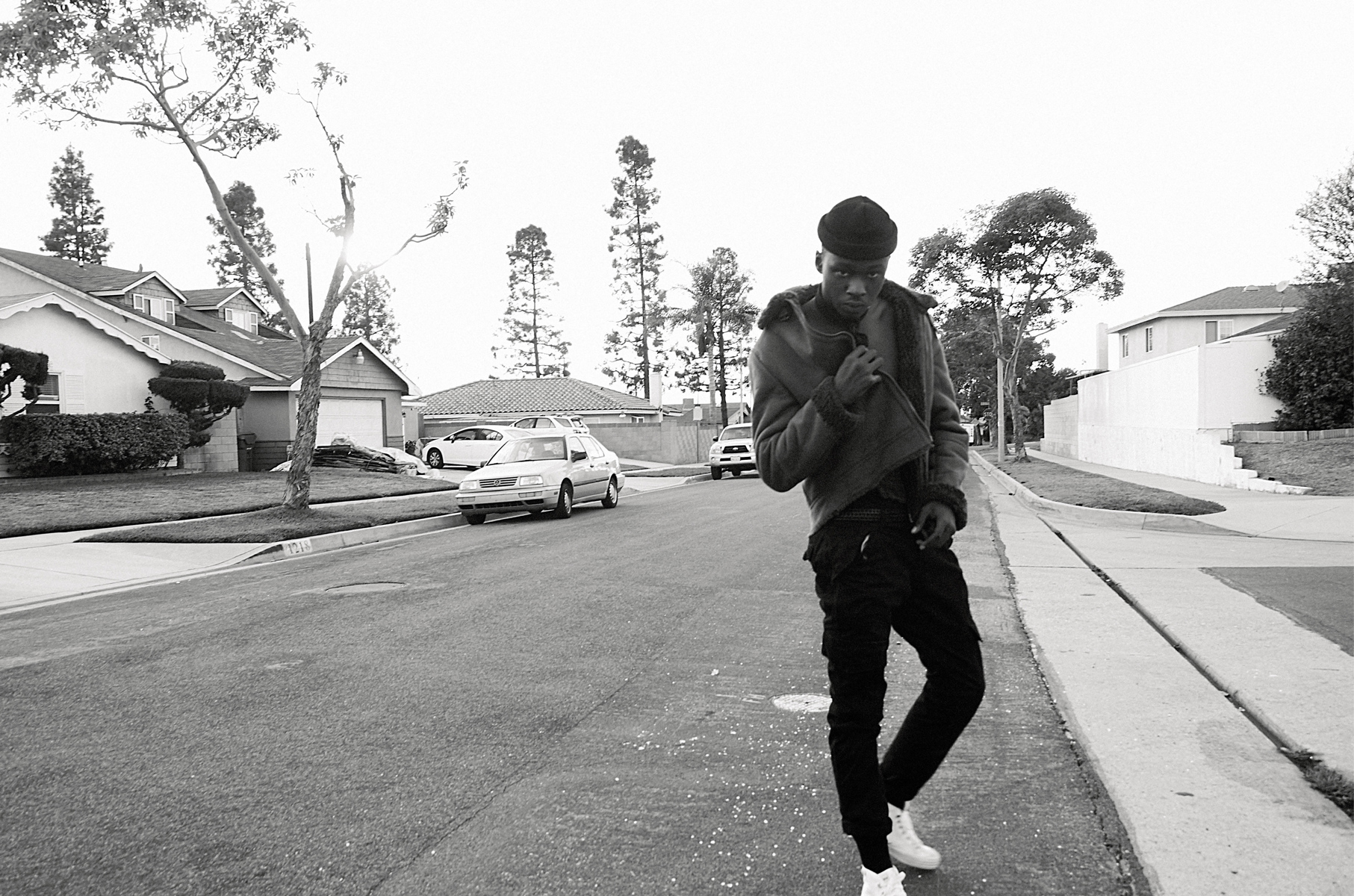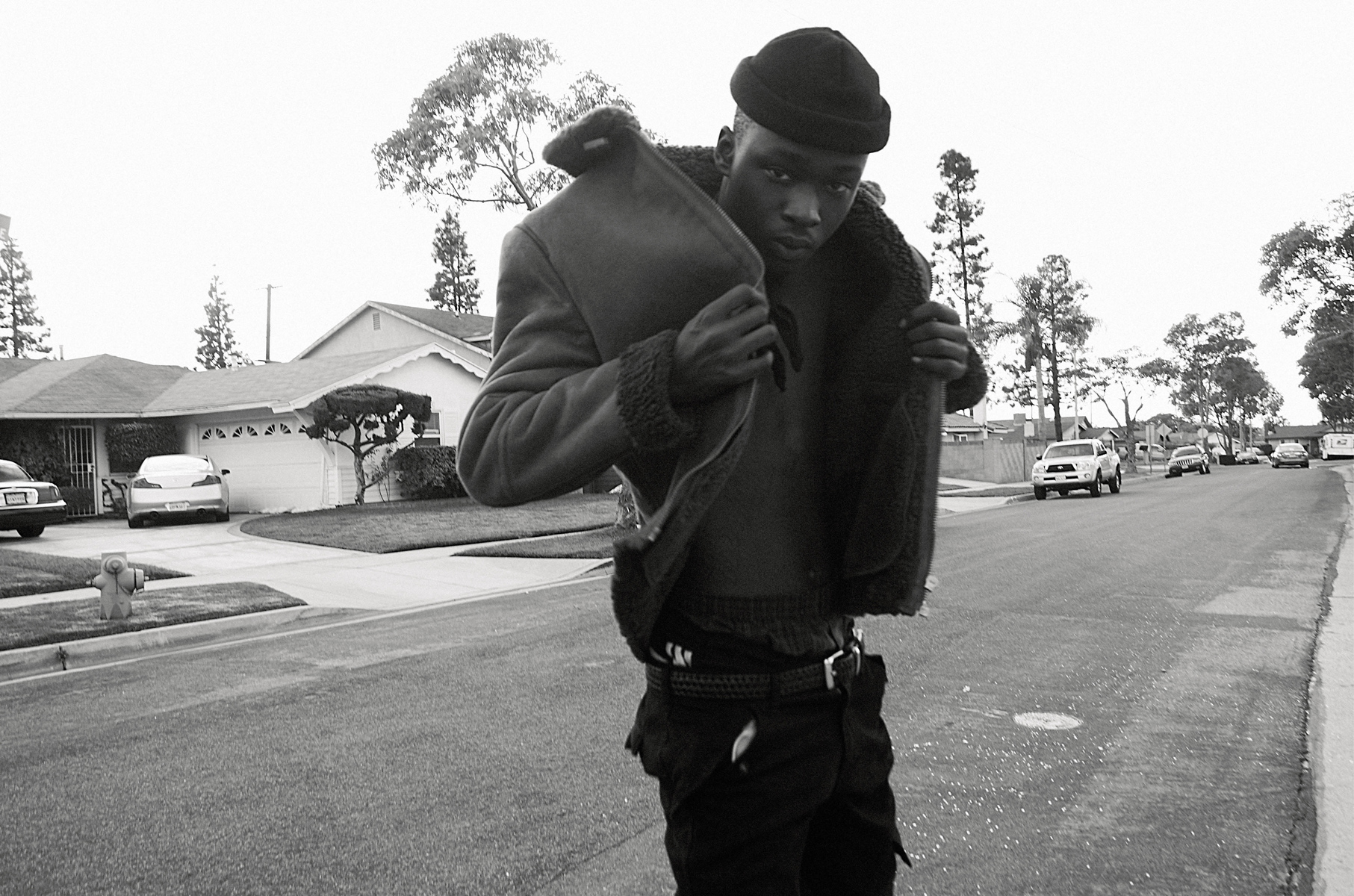Ashton Sanders
Interview by Barry Jenkins
Images by Jan-Willem Dikkers
Styling by Ashton Sanders
“I initially started acting to escape my family situation
and tap into other people’s lives. When I was
on stage, in character, I wasn’t worried about anything.
I was that character.”
— Ashton Sanders
Moonlight
A 2016 feature film by Barry Jenkins, Moonlight stars Trevante Rhodes, Ashton Sanders, Naomie Harris, Mahershala Ali and Janelle Monáe. Adapted from the play In Moonlight Black Boys Look Blue by Tarell McCraney, the triptych-like narrative follows a young black man grappling with his sexuality while he grows up in poverty-stricken 1980s Miami. Premiering to immense acclaim at the Telluride Film Festival, Moonlight has since been lauded with dozens of awards, including six Golden Globes nominations. The film has also won the AFI Movie of the Year; Best Picture at the Los Angeles Film Critics Association Awards; Best Narrative Feature and Audience Choice Awards at the Chicago International Film Festival, among many others.
Ashton Sanders
Ashton Sanders is an actor known for his performance as Chiron in the critically-acclaimed Moonlight, for which he has garnered many awards and commendations. He has also appeared in Straight Outta Compton (2015) and The Retrieval (2013), and was formerly enrolled in the acting program at DePaul University, Chicago.
Barry Jenkins
Filmmaker Barry Jenkins is best known for Moonlight (2016), which follows a series of short films and his 2008 debut feature, Medicine for Melancholy. He has been critically lauded for his screenplay and direction of Moonlight, which debuted at Telluride earlier this year and has since won a ream of awards and six Golden Globe nominations, two for Jenkins himself. He has also received commendations including: the Gotham Independent Film Award for Best Screenplay; The Los Angeles Film Critics Association Awards for Best Director; and the New York Film Critics Circle Awards for Best Director.
Tarell McCraney
Playwright and actor Tarell McCraney was raised in Miami in the 1980s, and is known for his critically lauded works The Brother/Sister Plays and Head of Passes. His play In Moonlight Black Boys Look Blue inspired the film Moonlight by Barry Jenkins. McCraney won a MacArthur fellowship in 2013, and has been named the new chairman of the playwriting department at the Yale School of Drama.
Trevante Rhodes
Raised in Texas, Trevante Rhodes came to acting after running track in college. He co-stars as Chiron in Moonlight, in the adult version of the character and has appeared in HBO’s Westworld as well as the Tyler Perry series If Loving You Is Wrong. Rhodes will appear in the forthcoming Terrence Malick film Weightless.
With just a few small movie roles behind him, actor Ashton Sanders co-stars as Chiron in Barry Jenkins’ Moonlight as devastating portrait of a gay man growing up with a crack addicted mother in 1980s Miami. The film, inspired by Tarell McCraney’s play In Moonlight Black Boys Look Blue, is presented in three distinct acts: childhood, teenage years, and adulthood. The child Chiron, nicknamed ‘Little’, is played by newcomer Alex R. Hibbert; teenage Chiron by Sanders; and adult Chiron, nicknamed ‘Black’, by Trevante Rhodes. In life, the three actors never met, but portrayed a seamless character, repressed and deeply shy as he navigates his home life and sexuality.
Moonlight is more poetry than narrative, more atmosphere than plotting and lends itself to fully observing Sander’s keen awareness, vulnerability and subtlety as Chiron, who struggles with poverty, ridicule, heartbreak and notions of masculinity. Since its premiere at Telluride in September 2016, Moonlight has become a near-unanimous hit with critics and garnered hundreds of awards and nominations internationally—all of this unsurprising: the film is a triumph in character study.
In the year since filming wrapped, writer-director Jenkins has become a close friend and mentor to Sanders, who has dropped out of Chicago’s DePaul University to pursue acting full-time. Both are navigating their own burgeoning careers, and sit down to discuss Moonlight’s incredible success, parallels between Chiron’s story and their own lives, and being in love with process rather than the result.

Barry Jenkins: How you feelin’ man?
Ashton Sanders: This is not real, man. But it’s a blessing, you know? Everything is happening so fast. I’m just trying to take everything in.
BJ: What do you mean everything is happening so fast? The movie has been done for a whole year.
AS: I was kind of lost in playing Chiron, so it’s crazy to be outside of the character now. Every time I see the film, I have to watch it for what it is, like, “Yo, that’s not me.” It’s surreal. The reception of the film has been really cool. I dropped school to pursue my acting career.
BJ: You know I wasn’t happy with that.
AS: I know, I know.
BJ: I’m not unhappy with you, I’m unhappy with that choice. But I also respect you as a man to make your own decisions. School will always be there.
AS: I’m 21, and I was going to school for acting. I can still take acting classes—that is super essential. The door is so open for me, I would’ve been a fool to not take these opportunities. But that shit was hard man. It was a major life decision.
“Even though you have proven you can do
some really extraordinary things,
you are still developing. The ceiling is much,
much higher. Just always remember:
You may be the shit, but you can be even more
the shit.”
— Barry Jenkins
BJ: I will say, I think there are things you would definitely pick up in a conservatory that are useful. You have to find a way to learn those things in the process, on set. Even though you have proven you can do some really extraordinary things, you are still developing. The ceiling is much, much higher, and I think in a conservatory, you work towards that ceiling. Just always remember: You may be the shit, but you can be even more the shit.
AS: Thank you, I needed to hear that.
BJ: Alright, I want to get back to Moonlight. When you first got the script, what went through your head?
AS: This is going to sound cliché, but once I read the script, I knew I had this part. I immediately connected with it and wanted to be this character. I fell in love, Barry. I’ve fallen in love with everything I’ve read by Tarell McCraney—just his name on the front page was super rad to me—so I knew it was about to be the dopest read ever. l had even been in his work prior: I played Ooshi in The Brother Size. His dialogue is so relatable; the words just roll off my tongue. The script and the imagery are so beautiful; I was able to see the beach Chiron was sitting on. Also, the summer I received the script, my mom had a drug relapse, so I really needed to do something to get out.
BJ: I want to talk to you about that because I didn’t know about your mom relapsing until we were shooting that scene with Naomi Harris, who plays your mom in the film. You didn’t tell me.
AS: I know.
BJ: What was that experience like, for art to be imitating life?
AS: I didn’t think it was necessary to explain my process to you in creating this character. It just didn’t cross my mind. I didn’t want to be that dude, to bring people down. Plus, when I’m going through shit, I shut everything out and deal with it myself. I would go back to the hotel and cry and write poetry.
BJ: I’ve had that experience too, and that is why I did the movie. Everything you just said is why I saw myself in Chiron. So why did you decide to tell me when you told me on set?
AS: We were inside the trailer. I talked to Naomie [Harris] about it, too. It was kind of like that beach scene: you know it’s coming but you don’t think about it until you’re really there. Seeing Naomi in costume, knowing how this plot also resonated with you and how much of my soul I was about to give in those moments, I thought, “Alright Barry, I just want to let you know.”
That day was some of the most vulnerable acting I’ve ever done. There were people on set crying. It was so emotional. I remember you coming up to me and asking if I was all good. I just kept pushing. I read that Hollywood Reporter piece where you talked about how this project was therapy for you. It was therapy for me too. I feel like everything happens for a reason, and everyone involved in this project was involved for a reason. No one else could have played these parts.
BJ: Other people could have played these parts, but the characters would have been different. The place where we ended up is very unique because you all brought your true selves into the film. But let’s take a step a back—how did you get into acting? Take me as far back as you want, knowing that you are a young ass dude.
AS: Just like Chiron, I was bullied from elementary school to middle school. I felt like everyone had an outlet, whether it was playing basketball or whatever. I needed an escape, so in the summer of sixth grade, I started talking to my dad about acting classes. I had been watching TV and I thought I could do it. I was this crazy kid with a big imagination. So I enrolled in Amazing Grace Conservatory, which is Wendy Raquel Robinson’s acting program in Central Los Angeles. I initially started acting to escape my family situation and tap into other people’s lives. When I was on stage in character I wasn’t worried about anything. I was that character. So that’s how I approached the craft. I felt in love and was surrounded by so many like-minded artists. I was the weird kid growing up, and acting allowed me to be free, escape my reality and be surrounded by so much love.
BJ: Let me jump forward: When you booked The Retrieval how did that happen?
AS: Savage Agency scouted me at a play in high school in ninth grade. I was super pre-pubescent, but they saw something in me. The audition for The Retrieval was intense, even though it was super low budget. It was my first Hollywood movie, so I’m expecting everything “Hollywood,” but it wasn’t like that. I was in Texas filming for two months and they didn’t have trailers. It was the coldest winter in Texas, and I had to wear these slave clothes. In one scene, I’m walking in a frozen river and fall over, and the water freezes around my hand. I wasn’t expecting anything to happen with the film, but it got a little bit of support, so that was rad. I was fifteen when I shot it.
“I’ve seen the film five times, and I notice
something different about everybody’s
performances each time.
It’s amazing how everything matched up.
It was so spot-on and perfect—
great direction, great artists and a great script.”
— Ashton Sanders
BJ: Your next credit was Straight Outta Compton. So what happened between those two?
AS: I was working on my craft, doing plays and auditioning, but I was auditioning for the wrong stuff, like Disney Channel, which clearly isn’t my vibe. The crazy part is that it took three years for The Retrieval to actually get distribution and go to theatres—until my freshmen year of college. So The Retrieval was coming out in theatres when I auditioned for Straight Outta Compton, which I booked that summer. The next summer, I auditioned for your project and had Compton playing in theaters.
BJ: It’s funny, I remember having no idea you were in Compton. We had already cast you and I remember watching it in the theatre like, “I think that’s Ashton.” Everyone was waiting for the credits. It was a small part, but you are the center of the frame for those two or three minutes. I was like, “This kid’s good.”
But [when you were auditioning] and we were casting [the character of] Kevin, at first we were trying to cast for chemistry. We brought in one Kevin who was not very good, and it made your performance bad. The first thing I said to you was, “You can’t let the person opposite you dictate the level you’re at.” But then you stood up and basically said, “I’m tired of this.” I respected you for that. I was telling a class at AFI (American Film Institute), that the experience did two things for me: One, I did realize that I was putting you through the ringer; two, it helped me solidify what to look for. It’s not about chemistry. Let me find the [series of actors playing] Chiron, who have the same feeling and the same soul, and get away from the chemistry.
What you, Alex Hibbert and Trevante Rhodes do in the film is interesting [playing Chiron at different ages]. The question I get most often is about the fact that you all never met each other. How does it feel to look at the screen and see somebody else basically playing you or your character?
AS: It was like a magic trick. We are all different variations of each other—all kind of the same person. When I met everyone for the first time in Toronto, it was like we’d known each other for years. These are literally my brothers. I’ve seen the film five times, and I notice something different about everybody’s performances each time. It’s amazing how everything matched up. It was so spot-on and perfect—great direction, great artists and a great script.
Mahershala Ali
Actor Mahershala Ali is known for his role as Juan in Moonlight, a drug dealer who helps Chiron as a child. He also holds recurring roles in House of Cards, Luke Cage and The Hunger Games films, and has appeared in The Curious Case of Benjamin Button, Predators, The Place Beyond the Pines and Free State of Jones.
BJ: Let’s talk about another Moonlight actor: Mahershala Ali [who plays Juan, a drug dealer who helps raise Chiron as a child]. Is he a mentor to you?
AS: He’s so dope. He is mentoring me right now, and I respect him a lot. We talk about negotiating scripts because I’m super picky. He tells me there is no rush, that it is important for me to stay true to my artistry and myself. I needed to hear that. He’s a man who I want to be like. I’m about to be an uncle to his baby.
BJ: You don’t know this, but I sat behind you at that screening in Toronto. At the end of the story, one of you reached over to the other and grabbed him. You were so happy for each other. Mahershala has spent 20 years in the industry to get to a film like this. You’ve been in the industry for six months, so how does that feel?
Lupita Nyong’o
Kenyan actor Lupita Nyong’o is best known for her debut role in 12 Years a Slave (2013), for which she won the Oscar for Best Supporting Actress. Since, she made her Broadway debut in Eclipsed (2015), receiving a Tony nomination for her performance.
AS: It’s a blessing to have relationships with artists like you and Naomie Harris, Andre Holland and Janelle Monaé. I remember us doing press in Toronto, and Lupita Nyong’o came up. I’m standing next to Mahershala and Lupita is right there, over my shoulder, and I didn’t say a word. Sometimes I feel like I just got lucky.
BJ: It wasn’t luck. You earned the part. And then what you did with it, that’s all up to you. There is always a series of events. When we were on set, did you ever think we’d be sitting at the Soho House having a conversation for a magazine feature?
AS: No, never man.
“What we do, I don’t like to think of it as special.
The acting you did was special.
The result right now is becoming very
fucking special. But what we did was not special;
we were just working.
It’s important to remember that.”
— Barry Jenkins
BJ: Whenever you have this feeling you have to really cherish and appreciate it. Because what we do, I don’t like to think of it as special. The acting you did was special. The result right now is becoming very fucking special. But what we did was not special; we were just working. It’s important to remember that.
AS: Totally man. That’s my biggest thing. I didn’t know what to expect from this project. I like creating art, and that is what it is. It is dope to have all of this for sure, but I’m an artist first.
Hilton Als
American writer and theater critic Hilton Als is a regular contributor to The New Yorker and a former staff writer at the Village Voice and editor-at-large for Vibe magazine. Als was shortlisted for the 2013 National Book Critics Circle Award for White Girls (2013), and won the Windham-Campbell Literature Prize for White Girls and The Women (1996).
BJ: I want an honest answer: When you read the Hilton Als piece in The New Yorker, what was that like?
AS: I felt like the man. Damn, me? Pinch me. It gave me chills. I was honored.
BJ: What does the future hold for Ashton Sanders?
AS: Hard work. Dedication. Knowing myself, continuously being myself and not conforming for other people. I want to have my hands in everything: acting, fashion, cinematography, directing. So I’m just building myself up right now. I’ve been having some conversations with God and following my intuition. I want to leave a mark on this world. I want to inspire.
BJ: One thing I will say to you as a mentor is to be more in love with the process and not the result. Leaving a mark is much less important than building yourself.
“I’ll be calling shit out
so the universe will hear it.”
— Ashton Sanders
AS: That is what the future is: having my hands in everything, building myself up. Hopefully the result will leave a mark. I already know that I’m going to put in the work. It’s the law of attraction. I’m a strong believer in that. I’ll be calling shit out so the universe will hear it.
